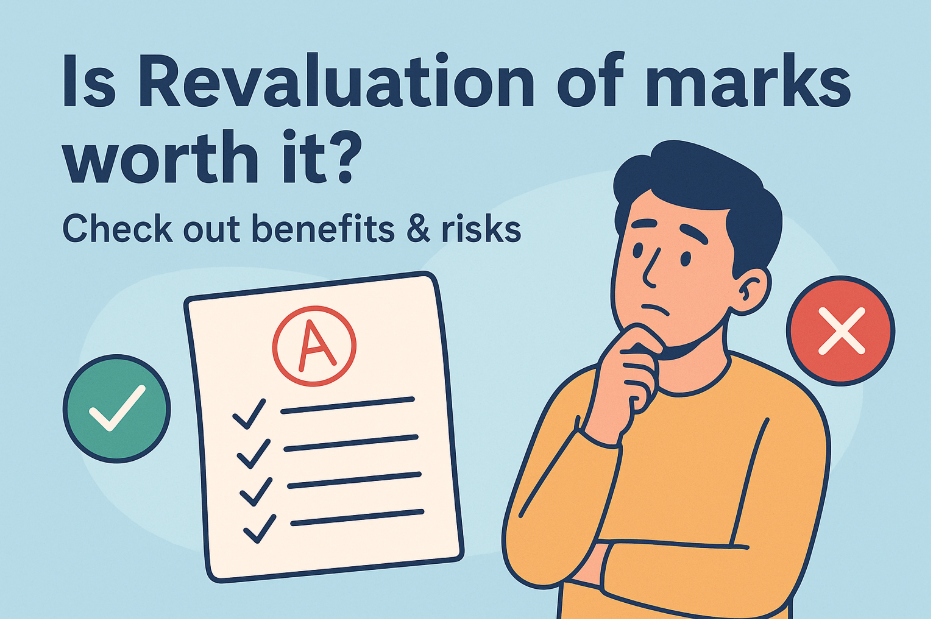Every student waits for their exam results and when they finally arrive some students are satisfied while others aren’t. And when you aren't satisfied with your marks you wonder ‘Should I apply for revaluation or rechecking of the marks? Is it worth it? So don’t worry. You will find your answers in this blog.
In this blog you will understand all about the benefits, risks of re-checking and whether revaluation and rechecking is worth it for your exam marks.
Also check out ‘exam preparation for adult learners’ and ‘Exam essentials guide’.
Difference between Re-checking and Revaluation
Colleges and universities have different rules for re-checking and revaluation, but the basic idea remains similar everywhere.
| Feature | Re-checking | Revaluation |
|---|---|---|
| What happens? | Only recounting of marks; checking if totals are correct | The entire answer sheet is reviewed again |
| Are answers re-evaluated? | No | Yes |
| Can marks increase? | Yes (but usually limited) | Yes (sometimes significantly) |
| Can marks decrease? | Rarely | Yes, in some universities |
| Who evaluates? | Administrative staff | Senior examiners or subject experts |
| Best for | Calculation mistakes | Concept-based mistakes or unfair evaluation |
Why students consider doing revaluation of their marks
Following are the reasons students go for revaluation:
1. Unexpectedly low marks
2. Marks far below performance
3. Difference between internal and external marks
4. Fear of calculation or totaling mistakes
5. A friend with a similar paper scoring much higher
6. High importance exams (university exam, college exam, final-year exams, competitive qualifying exams ‘Check out ‘Gmat Exam 2026’ and ‘Microbiology entrance exams’)
Benefits of Re-checking
1. Detects calculation errors and there are chances of getting extra marks if Some answers weren’t counted, Totals were added incorrectly or Marks didn’t transfer from answer sheet to front page
2. Re-checking usually does not reduce marks, making it a safe option.
3. It is good for subjects like Maths, Accounts, Physics, numericals, and subjects as they have step-wise marking and is often more beneficial.
Benefits of Revaluation
1. Marks can increase and there are cases where students got 10–20 marks more, some Grace marks applied, and their Completely overlooked answers finally evaluated
2. Literature, Law, History, Sociology, Political Science, Psychology, and similar subjects often get subjective marking and revelation is beneficial for that.
3. It is useful when your career depends on it and even a small increase in marks can help you.
Risks of Revaluation
1. Revaluation can reduce your marks, depending on university rules.
2. The examiner may agree with the marks given in the first go.
3. Each paper may cost between ₹300–₹2000 depending on the college or university.
4. Revaluation results take 2–6 weeks, which can delay Admissions, Applications, Backlog registrations and Jobs requiring mark sheets.
Should you Apply for Re-checking or Revaluation?
Use the following table to decide if you should apply:
| Situation | Re-checking? | Revaluation? |
|---|---|---|
| Marks far lower than expected | Not enough | Strongly recommended |
| Suspect totaling errors | Yes | Not needed |
| Need just 1–5 marks to pass | Try first | If re-checking doesn’t help |
| Subjective subject (theory) | No | Yes |
| Objective subject (numericals) | Yes | No |
| Very important exam for career | Yes | Yes |
| Marks may decrease due to revaluation | Safer | Apply carefully |
Signs you Should Apply
- Your wrote the answers well compared to marks received
- You consistently score better in that subject
- You were confident after the exam
- A major question (5–10 marks) was definitely correct
- University is known for evaluation mistakes
Signs you Shouldn’t Apply
- You know you wrote the paper poorly
- You left multiple questions blank
- The subject is highly objective and answers were wrong
- You are financially restricted
- You cannot risk marks decreasing
How Colleges and Universities Handle Revaluation
1. Your application is submitted mostly through online portals
2. The payment is made where fees vary as per institution
3. Your answer sheet is retrieved
4. Evaluation is done by a new examiner who checks correctness, marking scheme, skipped answers and fairness.
5. Your revised marks are uploaded to the university website.
When Should You Apply?
1. You barely missed a pass mark
2. You are just 1–2 marks short of distinction
3. You need marks to qualify for the next semester
4. You are applying for higher studies abroad
5. You require a certain percentage for scholarships
Why do Marks get Increased or Decreased after Revaluation or Re-Checking?
1. There are answers that are unchecked
2. There are errors in totalling the marks
3. There can be misinterpretation of answers
4. There is either strict or lenient checking
5. There are poorly scanned or damaged answer sheets
6. The answers are written in the wrong section or given a wrong question number.
FAQ’s
1. Is revaluation really helpful?
Ans: Yes, especially in theory subjects where marking varies from one examiner to another.
2. Can marks decrease after revaluation or rechecking?
Ans: Yes. In many universities, marks can go up or down.
3. Should I apply for all subjects?
Ans: No. Apply only for papers where your performance was clearly better than your marks.
4. Is revaluation costly?
Ans: Depends on your college, but usually ₹300–₹2000 per subject.
5. Does revaluation guarantee passing?
Ans: No guarantee, but many students do pass after revaluation.
6. Are revaluation results accepted for admission?
Ans: Yes, revised marks are considered final for all official purposes.

